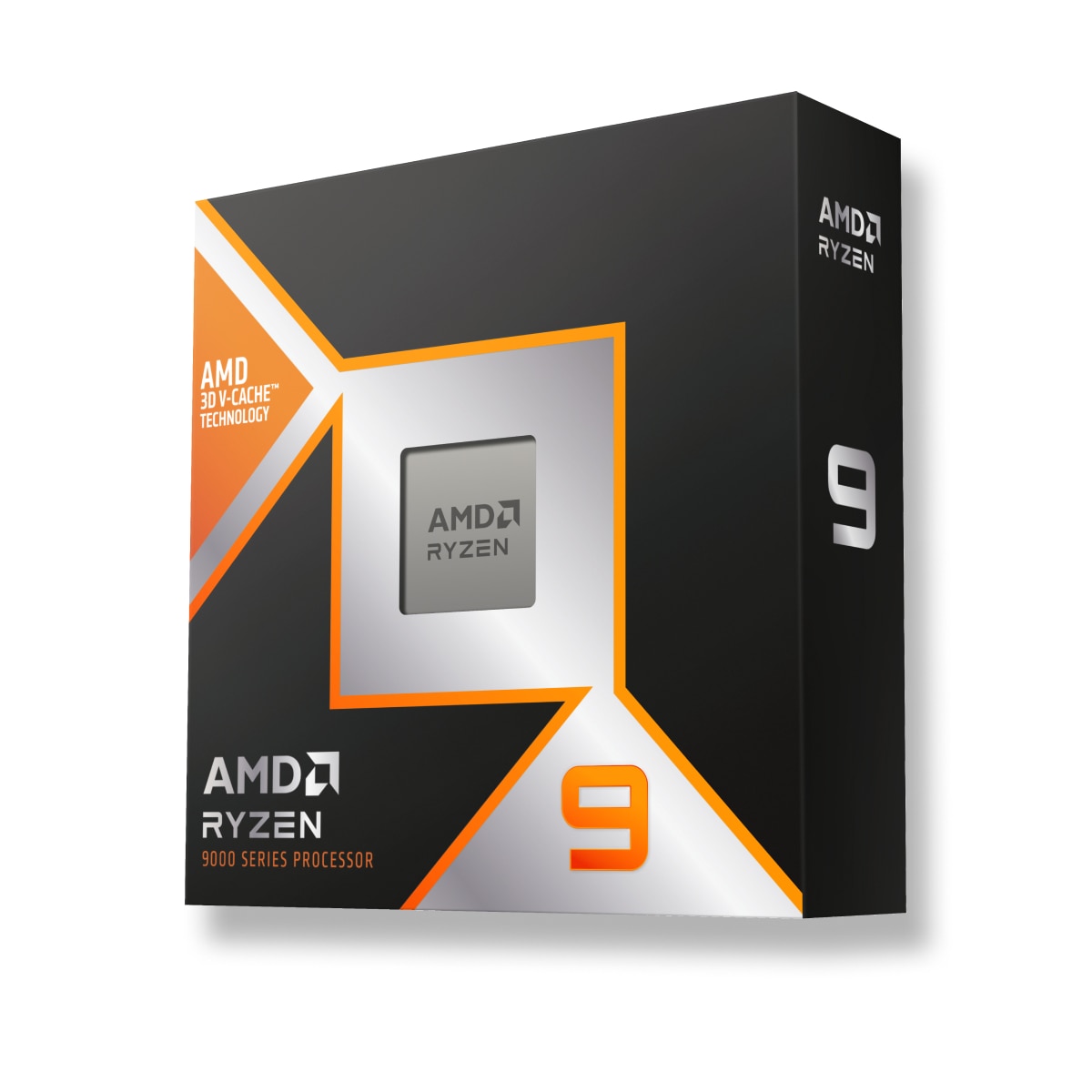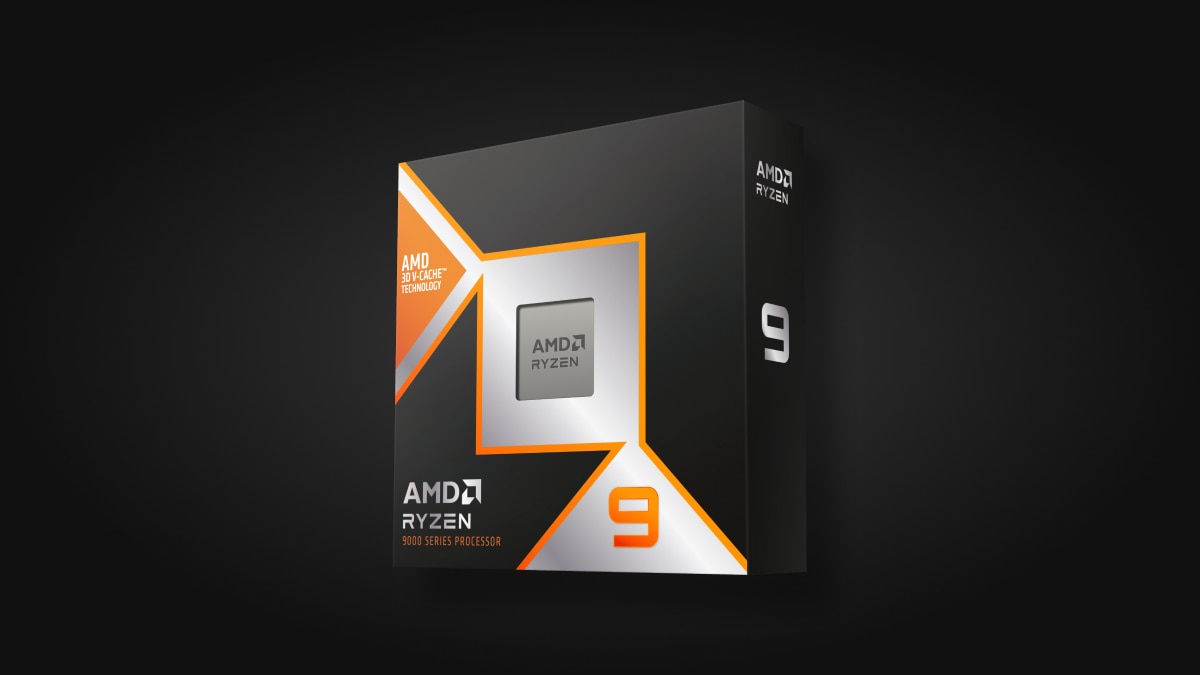Choosing a good processor is key for gaming. The CPU affects how fast your games run and how well they play. It works with your graphics card to make sure everything looks smooth on screen. The AMD Ryzen 7 9800X3D is currently the best gaming CPU for most players thanks to its excellent balance of price and performance.
Best Processor for Gaming in 2025: Ranked
As gaming technology advances, having the right CPU can make a significant difference in your gaming experience. In 2025, AMD continues to dominate the gaming CPU landscape with its innovative 3D V-Cache technology, delivering exceptional frame rates and smooth gameplay. Here’s a detailed ranking of the best processors for gaming this year, focusing on performance, core count, and gaming-specific features.
1. AMD Ryzen 9 9950X3D

Topping the charts in 2025 is the AMD Ryzen 9 9950X3D, featuring 16 cores and advanced 3D V-Cache technology. This processor is designed to handle the most demanding games and multitasking workloads with ease. Its large cache significantly boosts gaming performance, resulting in higher frame rates and reduced latency during gameplay. The Ryzen 9 9950X3D is perfect for gamers who also engage in streaming or creative work, thanks to its powerful multi-threading capabilities.
2. AMD Ryzen 9 9900X3D
Following closely is the AMD Ryzen 9 9900X3D, which strikes a perfect balance between raw performance and efficiency. Also equipped with 16 cores and 32 threads, it clocks up to 5.8 GHz, making it a powerhouse for both current and next-gen titles.
It excels in esports and fast-paced games, delivering over 240 frames per second in competitive scenarios. This CPU is ideal for gamers looking for top-tier performance with excellent future-proofing.
3. AMD Ryzen 7 9800X3D
The AMD Ryzen 7 9800X3D is another standout processor that leverages 3D V-Cache technology to enhance gaming frame rates. With slightly fewer cores than the Ryzen 9 models, it still offers exceptional performance for modern AAA titles and multitasking. This CPU is a great choice for gamers who want high-end performance without stepping into the highest price bracket.
Detailed Comparison Table: Best Gaming CPUs 2025
| Rank | Processor | Cores / Threads | Max Clock Speed | 3D V-Cache | Ideal For | Approximate FPS in Gaming | Price Range |
|---|---|---|---|---|---|---|---|
| 1 | AMD Ryzen 9 9950X3D | 16 / 32 | Up to 5.6 GHz | Yes | Hardcore gaming, streaming, creative workloads | Very High (top-tier) | High-end |
| 2 | AMD Ryzen 9 9900X3D | 16 / 32 | Up to 5.8 GHz | Yes | Competitive esports, future-proof gaming | 240+ FPS in esports | High-end |
| 3 | AMD Ryzen 7 9800X3D | 8 / 16 | Up to 5.4 GHz | Yes | AAA gaming, multitasking | High FPS | Upper-mid range |
Why AMD Ryzen 3D V-Cache CPUs Lead in 2025
The key to AMD’s dominance in gaming CPUs this year is the incorporation of 3D V-Cache technology. This innovation stacks additional cache memory vertically on the processor die, drastically reducing latency and improving data access speeds. The result is a significant uplift in gaming performance, especially in CPU-bound scenarios.
Gamers benefit from smoother frame rates, reduced stuttering, and better overall responsiveness. Whether you are playing the latest AAA titles or engaging in competitive esports, these CPUs provide the horsepower needed to stay ahead.
For those looking to build or upgrade their gaming rigs in 2025, the AMD Ryzen 9 9950X3D stands out as the ultimate choice. However, the Ryzen 9 9900X3D and Ryzen 7 9800X3D offer excellent alternatives that balance price and performance effectively.
Gaming processors come in different types from companies like AMD and Intel. Some are better for budget builds while others are made for high-end gaming rigs. The right choice depends on what games you play, your budget, and what other parts you have in your computer. A good processor will help your games run without lag or stuttering.
AMD Ryzen 9 9950X3D
The AMD Ryzen 9 9950X3D stands as a powerful gaming processor that has made a significant impact on the market. This 16-core CPU comes with 2nd generation AMD 3D V-Cache Technology, making it a top choice for serious gamers and content creators alike.
Gaming performance is where this processor truly shines. Tests show it’s incredibly fast at 1080p gaming, beating Intel’s flagship Core 9 285K by an impressive 37% on average. That’s a huge advantage in competitive gaming scenarios.
The processor handles both gaming and productivity tasks with ease. Unlike some gaming-focused CPUs that sacrifice work performance, the 9950X3D maintains strong capabilities for content creation and other demanding applications.
Recent benchmarks using the GeForce RTX 5090 show that the processor matters even at 4K resolution. This contradicts the old belief that CPU differences become negligible at higher resolutions.
When compared to other AMD offerings, the 9950X3D faces competition mainly from the 9800X3D. In gaming tests at 1080p, the 9800X3D sometimes edges ahead, though the 9950X3D offers more cores for multi-tasking and productivity.
The processor’s 3D V-Cache technology gives it an edge in games that benefit from large, fast cache. This technology stacks additional cache memory vertically, reducing latency and improving gaming performance.
For builders looking to create a premium gaming system, this processor represents the current peak of gaming performance. The multiple reviews consistently praise its capabilities, particularly for those who want a no-compromise gaming experience.
While the price sits at the premium end of the spectrum, the performance justifies the cost for enthusiasts who demand the absolute best. The processor delivers what AMD calls “incredible performance for the most demanding gamers and creators”.
Temperature management has improved over previous generations, though proper cooling is still important to maintain peak performance during extended gaming sessions.
AMD Ryzen 7 9800X3D
The AMD Ryzen 7 9800X3D has taken the gaming world by storm. It’s currently the fastest gaming chip on the market, outperforming even Intel’s more expensive offerings.
What makes this processor special is the 3D V-Cache technology. This design stacks additional cache memory on top of the processor, giving games quick access to more data.
The 9800X3D is built on AMD’s newer Zen 5 architecture. This upgrade brings noticeable improvements over previous generations, especially in gaming tasks.
Testing shows the 9800X3D is about 11.4% faster in gaming at 1080p than its predecessor, the 7800X3D. That’s a solid jump in performance.
Power consumption has increased with this new model. The chip uses roughly 45% more power than the previous generation, which is something to keep in mind when planning your cooling solution.
Many gamers appreciate that the 9800X3D comes with full feature support. Unlike some specialized gaming chips, you don’t sacrifice other capabilities for gaming performance.
For most people playing at higher resolutions, the performance difference might be smaller. Several user reports on Reddit suggest that at 1440p or 4K, the benefits aren’t as dramatic as at 1080p.
The processor has gained popularity quickly. Its performance in CPU-intensive games is particularly impressive, creating a smooth experience even in demanding titles.
For gamers wanting the absolute best performance without compromise, the 9800X3D makes a strong case. It handles multitasking well too, so streaming while gaming won’t cause issues.
The price reflects its premium position, but for enthusiasts chasing maximum frame rates, many feel the cost is justified. The performance edge in competitive gaming can make a noticeable difference.
Intel Core i7-14700K
The Intel Core i7-14700K stands out as an excellent gaming processor that offers tremendous value. It delivers performance equivalent to the Core i9-13900K and Ryzen 9 7950X3D while costing nearly $200 less than these top-tier chips.
Gamers will appreciate the i7-14700K’s ability to produce high frame rates across various titles. The chip doesn’t just excel at gaming – it also handles multithreaded tasks impressively well, making it suitable for streamers and content creators who game.
This processor represents the best value in Intel’s refreshed “Raptor Lake” CPU lineup. PCMag’s review highlights that it brings notable improvements over previous generations without increasing the price, which is refreshing in today’s market.
One key advantage of the 14700K is its increased core count compared to previous i7 models. This boost helps it handle demanding applications and multitasking scenarios that gamers often encounter when running discord, browsers, and streaming software alongside games.
Temperature management is important with this processor. While it delivers exceptional performance, users should pair it with a quality cooling solution to maintain optimal speeds during extended gaming sessions.
For gaming in 2024, the i7-14700K is more than capable. According to Quora discussions, it scores impressively in benchmarks – around 39000 points in multi-core tests and 2100 points in single-core performance.
PC Gamer notes that the i7-14700K delivers consistently high frame rates without compromising on multithreaded performance. This balance makes it an attractive option for gamers who need a CPU that can handle more than just games.
The chip fits into existing Intel LGA 1700 motherboards with appropriate BIOS updates, offering an upgrade path for current 12th and 13th Gen Intel system owners. This compatibility helps reduce the overall cost for those looking to upgrade.
When building a gaming PC with a reasonable budget, the i7-14700K hits a sweet spot between price and performance. It provides much of what higher-priced CPUs offer without the premium price tag.
AMD Ryzen 7 7700
The AMD Ryzen 7 7700 stands out as a strong contender in the gaming CPU market. With eight cores and 16 threads, this processor handles gaming tasks with ease while also supporting everyday productivity needs.
For gamers looking to play at 1440p resolution, the Ryzen 7 7700 delivers fantastic gaming performance. It’s actually considered one of the best gaming chips available today, second only to AMD’s specialized X3D models.
One nice bonus is that AMD includes the Wraith Prism cooler with this CPU. This stock cooler features RGB lighting and does a decent job managing temperatures without requiring an immediate upgrade.
Value matters for gamers on a budget, and the 7700 hits a sweet spot. It offers exceptional value and overclocking potential compared to higher-end options that cost significantly more.
In gaming benchmarks, the Ryzen 7 7700 shines. It keeps frame rates high and consistent across many popular titles. This makes it a solid pick for gamers who want smooth gameplay without spending top dollar.
The processor works well for more than just gaming. While it’s not built for professional content creation, it handles almost anything short of pro-level work. Video editing, streaming, and multitasking all run smoothly on this chip.
When paired with a mid-range GPU like the RTX 4060 Ti, the Ryzen 7 7700 creates a balanced system. The CPU won’t bottleneck the graphics card, allowing for optimal gaming performance at both 1080p and 1440p resolutions.
Temperature management is another strong point. The 7700 runs cooler than some competing options, which helps maintain performance during long gaming sessions. This also contributes to the CPU’s lifespan.
Power efficiency is respectable too. The 7700 delivers strong performance without excessive power draw, which means lower electricity bills and less heat in your case compared to some alternatives.
For gamers building a new system in 2025, the Ryzen 7 7700 remains a smart choice that balances performance, price, and future readiness. It supports PCIe 5.0 and other modern technologies that will keep your system relevant for years.
Intel Core i7-8700K
The Intel Core i7-8700K remains a strong contender in the gaming CPU market despite its age. Released as part of Intel’s Coffee Lake lineup, this processor packs 6 cores and 12 threads with impressive clock speeds.
When overclocked to 5GHz, the 8700K can match even newer processors like the i9-10900K in many gaming scenarios. This shows why many gamers still stick with this CPU years after its release.
For pure gaming performance, the 8700K delivers excellent results at stock settings. Its high single-core performance helps in games that don’t fully use multiple cores.
The real question is whether you need to upgrade if you already have one. Many gamers with 8700K processors find they can still run modern games without issues. The CPU rarely becomes a bottleneck even with newer graphics cards.
Pairing with modern GPUs works surprisingly well. Users report good results when using an RTX 3080 with the 8700K, especially when the processor is overclocked.
For most gaming scenarios, the i7-8700K provides plenty of power. Games that require heavy CPU processing might benefit from newer chips, but the difference isn’t always noticeable during actual gameplay.
The processor was once considered overkill for gaming, but now sits comfortably in the sweet spot for price and performance if found at a good price on the used market.
Heat management can be challenging with this CPU, especially when overclocked. A quality cooling solution is recommended to get the most from this processor.
While newer CPUs do offer improvements, they come at a significant cost. The performance gap in most games doesn’t always justify the expense of a complete platform upgrade.
For gamers on a budget, finding a used 8700K might offer excellent value compared to the latest and greatest options on the market today.
AMD Ryzen 5 9600X
The AMD Ryzen 5 9600X sits in the sweet spot for gamers looking for solid performance without breaking the bank. This six-core processor offers impressive gaming capabilities at a competitive price point.
Recent reviews suggest the 9600X delivers outstanding gaming performance that beats many previous AMD processors. Only the specialized 7800X3D seems to edge it out in pure gaming scenarios.
Price-wise, the 9600X has seen some adjustments since launch. It’s now available at about $40 less than its initial price, making it a strong option in the sub-$250 category.
When comparing it to older models, the 9600X is faster than its predecessors but faces stiff competition. Some reviewers note it may need a further price reduction of $40-$50 to truly stand out against competing chips.
For budget-conscious gamers, this CPU shines brightest. It offers a smart balance of performance and value, especially when paired with a decent graphics card. The six cores provide enough power for both gaming and light productivity tasks.
Some users debate the value proposition. One perspective is that previous generation chips perform at about 95% of the 9600X’s level but at potentially lower prices on sale. This makes comparing prices across generations important before purchase.
The 9600X particularly excels when it comes to pure gaming tasks. It’s designed to offer solid performance at a low price, similar to its cousin the Ryzen 5 7600X.
Heat management is another plus for this processor. It runs cooler than some alternatives, allowing for more stable performance during long gaming sessions. This also means you won’t need to invest in expensive cooling solutions.
For builders working with a mid-range budget, the 9600X hits a nice balance. It provides enough power for current games while leaving room in the budget for a better graphics card, which often has a larger impact on gaming performance.
Ryzen 5 7600X
The Ryzen 5 7600X stands as a solid contender in the gaming CPU market. With 6 cores and 12 threads, this processor offers gamers strong performance for most modern titles.
One notable feature is its impressive boost clock speed that reaches up to 5.3 GHz, making it snappy for gaming and everyday tasks. The 38MB cache helps with quick data processing and keeps latency low.
The chip comes with integrated Radeon graphics. While not powerful enough for serious gaming, it can handle basic display needs if you’re waiting to buy a graphics card.
For gamers playing at 1440p resolution, the 7600X performs excellently. According to gaming enthusiasts, this CPU will be perfectly fine for everything you throw at it at this resolution.
Budget-conscious gamers should note that the 7600 (non-X version) offers nearly identical performance for a lower price. This makes the standard 7600 potentially a better value option for many builds.
The CPU uses AMD’s modern Zen 4 architecture, which brings improvements in efficiency and single-core performance. These enhancements directly benefit gaming, where single-core speed often matters most.
Price-performance ratio is where opinions split. Some reviews indicate the 7600X is beat out in many tests by lower-priced competition, raising questions about its value at current pricing.
For those building a new system in 2025, the 7600X remains a capable gaming chip but requires careful consideration of alternatives. Intel competitors and even other AMD options might offer better value depending on current pricing.
Gamers should pair this CPU with a decent cooler. While not the hottest chip AMD offers, proper cooling helps maintain those high boost clocks during extended gaming sessions.
The processor supports PCIe 5.0 and DDR5 memory, making it somewhat future-proof for upcoming gaming hardware and accessories. This adds some long-term value to the purchase.
Intel Core i7 Processors
The Intel Core i7 processor is a powerful choice for gamers who want excellent performance. This processor line sits above the i5 series but below the premium i9 models in Intel’s hierarchy.
For gaming in 2024, the Intel Core i7 11700K stands out as one of the best options. It features a base clock speed of 3.6 GHz and can boost up to 5 GHz. With eight cores, it handles demanding games without breaking a sweat.
When building a new gaming PC, it’s best to choose a recent generation i7. The 12700K or 13700K are recommended over older models. Newer generations offer better performance and efficiency improvements.
The i7 processors are designed for gamers who need more power than what an i5 can provide. For high-end gaming especially, an i7 is often recommended over an i5 because it delivers better performance for demanding workloads.
Intel’s i7 CPUs shine in games that can use multiple cores. They also excel at multitasking, which is perfect for gamers who stream or run other applications while playing.
The extra cores and threads in i7 processors help future-proof your gaming rig. As games become more complex and use more cores, an i7 will stay relevant longer than lower-tier options.
Heat management is important with these powerful chips. Good cooling solutions are necessary to maintain peak performance during long gaming sessions.
Price is another factor to consider. While i7 processors cost more than i5 models, they offer tangible benefits for serious gamers. The performance boost may be worth the extra investment for those who play demanding titles.
For the best gaming experience, pairing an i7 with a quality graphics card is essential. The processor can deliver fantastic frame rates in demanding games when matched with appropriate hardware.
AMD Ryzen 7 Series
The AMD Ryzen 7 series offers powerful options for gamers who want high performance without breaking the bank. These processors sit in the sweet spot between the budget-friendly Ryzen 5 and the premium Ryzen 9 options.
The Ryzen 7 9800X3D stands out as the best gaming CPU currently available. Its impressive 3D V-Cache technology gives it an edge in gaming performance over many competitors. The chip shows remarkable power efficiency too, using just 77W on average when running demanding games like Baldur’s Gate 3.
For gamers who stream on platforms like Twitch or watch YouTube videos on a second screen while gaming, the 9800X3D performs exceptionally well. It handles 4K gaming alongside these additional tasks without breaking a sweat.
The Ryzen 7 7700 offers another solid choice for gamers. It provides excellent all-around performance and efficiency. In games that don’t specifically take advantage of 3D V-Cache technology, it performs similarly to the more expensive options.
Moving to the newer generation, the Ryzen 7 9700X shows improvements over its predecessors primarily in power consumption and heat generation. While gaming performance gains are modest, the improved efficiency makes it worth considering for new builds.
AMD’s exclusive Gen 3D V-Cache technology gives many Ryzen 7 processors a significant gaming performance boost. This technology essentially adds more cache memory to the processor, allowing games to access critical data faster.
Most Ryzen 7 processors support PCIe 4.0 or newer standards, giving gamers access to the fastest SSDs and graphics cards available. This future-proofs your system for upcoming hardware releases.
The Ryzen 7 series typically includes 8 cores and 16 threads, which hits the perfect balance for gaming while handling background tasks. This makes them ideal for gamers who also edit videos or stream their gameplay.
Key Features of Gaming Processors
Gaming processors need specific features to deliver smooth gameplay and handle demanding titles. Understanding these features helps you make the right choice for your gaming rig.
Clock Speed and Cores
Clock speed measures how quickly a processor completes tasks, typically shown in GHz. For gaming, higher clock speeds often matter more than having many cores. The AMD Ryzen 7 9800X3D excels with its impressive clock speeds, making it a top gaming choice in 2025.
Most modern games use 4-8 cores effectively. While some can use more, the returns diminish beyond 8 cores for most titles. For example:
- 4 cores: Minimum for modern gaming
- 6 cores: Sweet spot for most gamers
- 8+ cores: Future-proofing and streaming
Newer processors like Intel’s Core i5 13400F offer a good balance of cores and speed at a budget price. CPU cache also matters – larger caches like AMD’s X3D technology help reduce data bottlenecks during gameplay.
Compatibility with Motherboards
Processors must match your motherboard’s socket type. AMD and Intel use different sockets, and these change between generations. Before upgrading, check if your current motherboard supports newer CPUs.
Key compatibility factors include:
- Socket type (AM5 for newer AMD, LGA 1700 for recent Intel)
- Chipset support for specific features
- BIOS updates that may be needed
Newer gaming CPUs often need newer motherboards with compatible features like PCIe 5.0 and DDR5 RAM support. This might increase your total upgrade cost. Some motherboards also limit overclocking – a feature gamers use to boost performance.
Power requirements matter too. High-performance gaming CPUs draw more power and generate more heat, so quality cooling solutions become essential.
Performance Factors
When choosing a gaming processor, certain technical aspects directly impact how well your games will run. These factors affect real-world performance beyond what basic specifications might suggest.
Thermal Management
Heat control is crucial for any gaming CPU. Modern processors generate significant heat during intense gaming sessions, which can lead to throttling if not managed properly.
Most high-end CPUs like the AMD Ryzen 7 9800X3D come with thermal limits that affect performance. Good cooling solutions like tower air coolers or all-in-one liquid coolers are essential for maintaining peak speeds.
The thermal design power (TDP) rating tells you how much heat a processor generates at base frequencies. Higher TDP chips typically need better cooling systems. For example, Intel’s H and HX designated processors for laptops are specifically designed to handle power and heat concerns.
Case airflow also matters. Even the best processor will struggle in a case with poor ventilation.
Overclocking Potential
Overclocking pushes a processor beyond its factory settings for extra performance. Not all CPUs have the same overclocking headroom.
Intel CPUs with a “K” designation and AMD processors marked with “X” are unlocked for overclocking. The Intel Core i5 13400F, while budget-friendly, has limited overclocking capabilities compared to higher-end models.
Successful overclocking depends on the silicon quality (often called the “silicon lottery”) and your cooling solution. Better cooling allows for higher, more stable overclocks.
Remember that overclocking increases power consumption and heat output. A processor running at stock settings with good cooling might perform better than a poorly overclocked CPU that keeps throttling due to temperature limits.
Motherboard quality also affects overclocking success, as robust power delivery components are needed for stable operation at higher frequencies.
Frequently Asked Questions
Processor selection can make or break your gaming experience. Budget constraints, brand preferences, and specific use cases all impact which CPU will work best for your gaming needs.
What CPU offers the best gaming performance on a budget?
The Intel Core i5-13400F stands out as an excellent budget gaming processor. It delivers strong performance without breaking the bank.
For those who prefer AMD, the Ryzen 7 7700 offers great value with its 8 cores and solid gaming performance at a competitive price point.
Budget gamers should look at previous generation processors too, as they often drop in price while still handling modern games well.
How does the Intel Core i7 compare to AMD Ryzen processors for gaming?
The Intel Core i7-14700K excels in raw gaming performance with its high clock speeds and efficient architecture. It performs exceptionally well in games that benefit from strong single-core performance.
AMD Ryzen processors like the 9800X3D use 3D V-Cache technology that gives them an edge in many gaming scenarios. This cache technology helps reduce latency and boost FPS, especially in CPU-intensive games.
The choice between Intel and AMD often comes down to specific games you play and whether you use your PC for tasks beyond gaming.
What should I look for when choosing a processor for a gaming laptop?
Power efficiency is critical for gaming laptops. Look for processors with good performance-per-watt ratios to maximize battery life.
Thermal performance matters too, as laptops have limited cooling compared to desktops. CPUs that run cooler will throttle less during extended gaming sessions.
Consider processors with integrated graphics as a backup to your dedicated GPU, which can help preserve battery life when not gaming.
Which is currently considered the fastest gaming CPU on the market?
The AMD Ryzen 9 9950X3D currently holds the crown as the fastest gaming CPU. Its 3D V-Cache technology gives it an advantage in reducing latency and boosting FPS in most games.
For pure gaming performance, the Ryzen 7 9800X3D is also exceptional and often recommended as the best processor for gaming due to its balance of price and performance.
Intel’s top offerings remain competitive in certain games and workloads, but AMD currently leads in pure gaming performance at the high end.
Can you recommend a top-performing processor for a gaming PC build?
The AMD Ryzen 7 9800X3D offers the best balance of gaming performance and price for most gamers building a high-end PC. Its 3D V-Cache technology delivers exceptional results in most modern games.
For those who prefer Intel, the Core i7-14700K is a fantastic option that delivers excellent gaming performance while also handling content creation and multitasking well.
Budget-conscious builders should consider the Core i5 series, which offers tremendous value and can handle most games without issue.
What’s a good CPU choice for someone looking to build a gaming phone?
For gaming phones, look for devices with Snapdragon 8 Gen 3 or MediaTek Dimensity 9300 series processors, as they offer the best mobile gaming performance available.
Cooling is crucial in gaming phones, so models with vapor chambers or active cooling solutions help maintain peak performance during extended gaming sessions.
Battery efficiency matters too, so newer processor generations typically offer better performance-per-watt ratios, allowing longer gaming sessions between charges.







